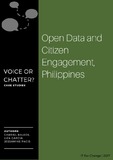| dc.contributor.author | Baleos, Gabriel | |
| dc.contributor.author | Garcia, Liza | |
| dc.contributor.author | Pacis, Jessamine | |
| dc.coverage.spatial | Philippines | en |
| dc.date.accessioned | 2017-10-09T13:59:25Z | |
| dc.date.available | 2017-10-09T13:59:25Z | |
| dc.date.issued | 2017 | |
| dc.identifier.citation | Baleos, G., Garcia, L. and Pacis, J. (2017) Open Data and citizen engagement, Philippines, IT for Change Case Study. | en |
| dc.identifier.uri | https://opendocs.ids.ac.uk/opendocs/handle/20.500.12413/13269 | |
| dc.description.abstract | Benigno Aquino III ran for the position of President of the Philippines in 2010, with a campaign slogan of “Kung walang corrupt, walang mahirap" (when there is no corruption, there is no poverty). Following his win, his administration initiated reforms in government that focused on improving financial management, budget transparency, government procurement, and local government transparency. Key among these was in 2011 when the Philippines became one of the founding partners of the Open Government Partnership (OGP), which aimed to provide an international platform for domestic reformers committed to making their governments more open, accountable, and responsive to citizens. This case study explores the introduction and implementation of open data by the Government of the Philippines. It first presents the government's enabling motivations and how the programme was conceived, then looks into the introduction and implementation of open data in the Philippines using Anthony Giddens’ theory of structuration as the analytical lens. It focuses on the key policy, technology, data, and public engagement components of the ODP implementation, including significant milestones and critical issues. The study aims to show how these work streams and the programme itself dealt with aligning the supply and demand sides of open data. It then assesses how effective open data has been as an ICT tool to achieve transparency and accountability and make significant shifts in meaning, power, and norms in the context of citizen engagement. At the same time, it looks at how such signification, domination, and legitimation - or the lack of - impacted on the effectiveness of the ODP as well. | en |
| dc.description.sponsorship | DFID | en |
| dc.description.sponsorship | USAID | en |
| dc.description.sponsorship | Sida | en |
| dc.description.sponsorship | Omidyar Network | en |
| dc.language.iso | en | en |
| dc.publisher | IT for Change | en |
| dc.rights.uri | http://creativecommons.org/licenses/by-nc-sa/4.0/ | en |
| dc.subject | Governance | en |
| dc.subject | Participation | en |
| dc.subject | Technology | en |
| dc.title | Open data and citizen engagement, Philippines | en |
| dc.type | Series paper (non-IDS) | en |
| dc.rights.holder | IT for Change | en |
| rioxxterms.funder | Default funder | en |
| rioxxterms.identifier.project | Default project | en |
| rioxxterms.version | NA | en |
| rioxxterms.funder.project | 9ce4e4dc-26e9-4d78-96e9-15e4dcac0642 | en |


